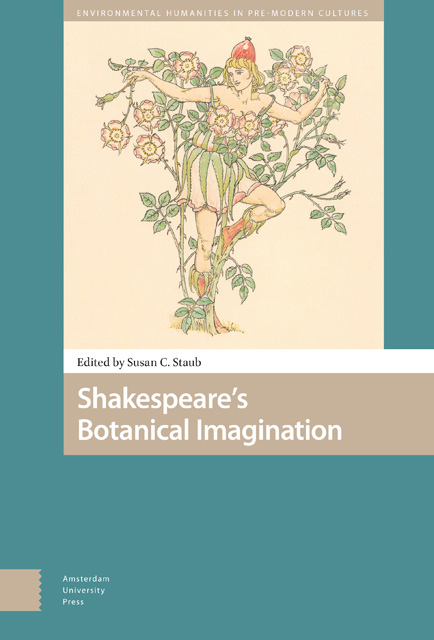6 - Cymbeline’s Plant People
Published online by Cambridge University Press: 17 October 2023
Summary
Abstract
Characters in Cymbeline are consistently described as plants or as utilizing plants. Thinking of characters as plants allows us to take a trans-corporeal perspective on identity in the play where human beings are materially interwoven with their surrounding environment rather than separate from and dominating the natural world. Focusing on people as living, developing plants also emphasizes ongoing process and transformation rather than fixed, static identities.
Keywords: ecocriticism, trans-corporeality, non-human, time, romance
“I cannot delve him to the root.” So begins the first Gentleman in describing Posthumus’s obscure lineage to the second Gentleman in Cymbeline. In a play concerned with individual and nationalist identities, plants, animals, climate, and geology not only situate characters within British ecologies, they offer ways to think about human identities as enmeshed in the non-human world. Many leading characters are linked to non-human nature in multiple ways. Innogen is likened to the air, to a budded branch and vines, her brothers to cedar branches and their rocky cave, Posthumus to plants and to a lion, and both the doctor and Queen’s characters are developed through their knowledge and manipulation of botanicals. Who and what one is can only be determined through one’s connection rather than opposition to the non-human. Although still considered one of Shakespeare’s lesser plays, Cymbeline presents one of Shakespeare’s most developed explorations of humanity’s place in the natural world.
During the early modern period, the definition of the human most commonly occurs through exceptionalism; one is what one is because one is not someone or something else. As Laurie Shannon argues, human exceptionalist discourse typically posits man as better than and above the environment. But through her focus on natural history and the zoographic tradition, Shannon persuasively argues that Shakespeare and Montaigne occasionally spin this construction on its head to argue that humankind is less than, not greater than, the animal world. Lacking a hide/shell adequate to nature’s extremes, mankind is “unaccommodated” and found incapable when challenged by nature’s extremes. During the period a non-binary view on human/animal also existed in which mankind shares attributes with the created world such as the vegetative, sensitive, and intellectual souls.
- Type
- Chapter
- Information
- Shakespeare's Botanical Imagination , pp. 149 - 170Publisher: Amsterdam University PressPrint publication year: 2023

